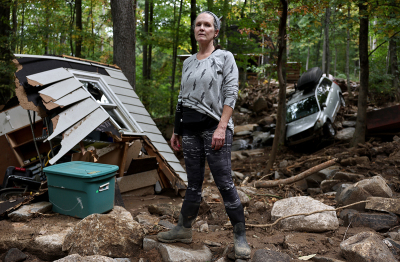Hurricane Helene is our time: The Church rushes in when disasters strike

As the president of a humanitarian organization, I’ve traveled the world, witnessing poverty and devastation countless times. Yet few experiences have shocked me as deeply as my visit to Western North Carolina just days after Hurricane Helene struck because what I was expecting was not what I saw.
The landscape was unrecognizable. Trees lay toppled. Homes were flattened or swept away. Everything was caked in mud from the landslides.
At one point, we encountered a section of road that had simply vanished, washed away by the storm. We had no choice but to navigate a narrow makeshift path created by locals to access the towns beyond. It was a harrowing moment, our vehicle teetering on the edge of a steep drop.
Yet, as terrifying as that was, it paled in comparison to the fear felt by those who had seen their entire communities devastated by Helene. Survivors now confront an uncertain future, unsure of how to begin the arduous process of recovery.
In my job, I usually spend my days ensuring that people in the most impoverished parts of countries like Honduras, Thailand, and Uganda have access to clean water, education, and basic necessities. I never imagined that these fundamental needs would be out of reach for people right here in the United States as well.
But this is the grim reality of many people in Western North Carolina after Hurricane Helene.
It’s the reality for the woman who arrived at the church where our team was distributing aid and, when asked what she needed most, replied that what she really needed was a hug. She said she felt bad even asking for that, though, after not being able to shower for a week.
It’s the reality for the family that trudged into the distribution center, covered in mud and carrying their few remaining belongings after walking for miles due to a washed-out bridge.
It’s the reality for the fire chief who showed up needing socks and boots for his team because their feet were soaked from relentless rescue work.
Western North Carolina is in desperate need of help.
Local churches are doing everything they can, but they are overwhelmed. One pastor, fighting back tears, told me, “If it had been one community, maybe we could have done more.” He gestured at a map showing all the affected areas and added, “but it’s everywhere.”
Another pastor shared how his team has been working 12 to 14 hours a day, tirelessly serving first responders and community members.
When I asked how we could best support them, they expressed a critical need for extra hands — volunteers to give their people a much-needed break to care for their own families and homes, also impacted by the storm.
In response, I began praying and organizing. Within a few days, we had a team on the ground to assist, followed by another team the next week, each bringing truckloads of supplies generously donated by our community in Virginia.
But I know it’s still just a drop in the bucket. It’s going to take all of us to help the people of Western North Carolina recover, especially as this crisis begins to fall out of the news.
This is the Church’s moment to shine.
This is what we are made for — to show people the love of Jesus, especially in times of crisis. It’s time for us to step up and do what we are called to do. And when we say “yes” to God, miraculous things are going to happen.
I’ve seen it happen already.
One day as our team was serving at the distribution center, a woman came through the line desperately seeking a very specific type of goat’s milk baby formula. It was the only food the baby could tolerate, and she couldn’t find it anywhere.
The team immediately begin scouring the mountains of donations, and finally they found it — one single can of the exact formula this baby needed.
It was a miraculous, tangible reminder to both this family and our team that even when all hope seems lost, God is still at work.
He was also at work when an elderly man came through the line, visibly broken and exhausted. When a team member said she would be praying for him, he immediately broke down sobbing and explained he had lost four family members recently and then lost everything in the storm. He felt he had no strength left to carry on.
Our team prayed with him and shared the Gospel, assuring him that God still loved him and had a purpose for his life. That day, he accepted Jesus as his Savior. He arrived in despair but left filled with hope.
He not only received the physical help he needed in that moment, but he is also now going to be in Heaven for all of eternity.
I can’t help but wonder what would have happened to that man if the Church hadn’t shown up that day. So many others are still waiting for help and hope.
It's time for the Church to be the Church.
When others rush out, we must rush in. When disaster strikes, we must show up.
We must be salt and light as Christ commanded us to be. We must bring hope to a hurting world.
We must be the Church.
Noel Yeatts is the president of World Help, a Christian humanitarian organization serving the physical and spiritual needs of people around the globe. World Help is working with its network of partners and churches to meet the most urgent needs in the areas of Western North Carolina hit hardest by Hurricane Helene. For more information or to donate, visit worldhelp.net/Helene.





















